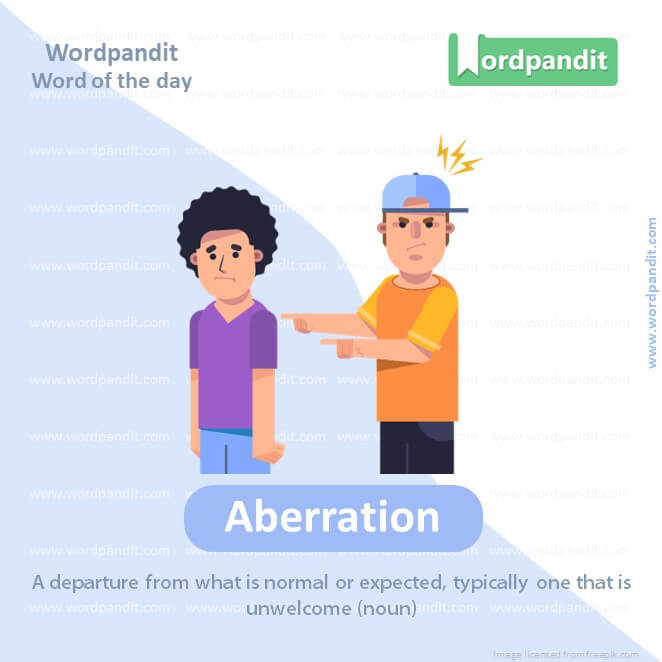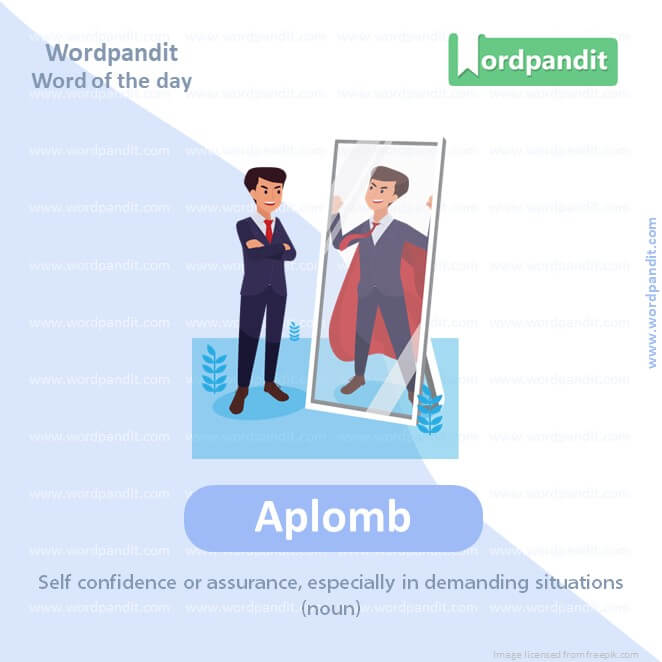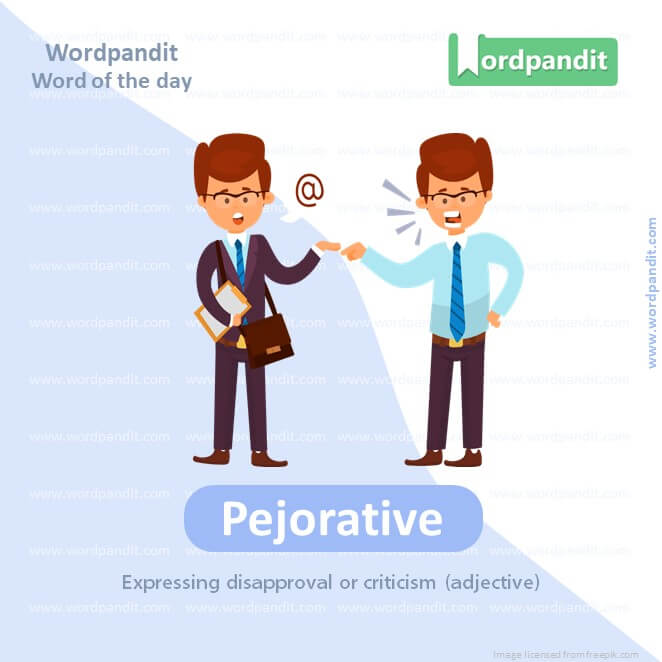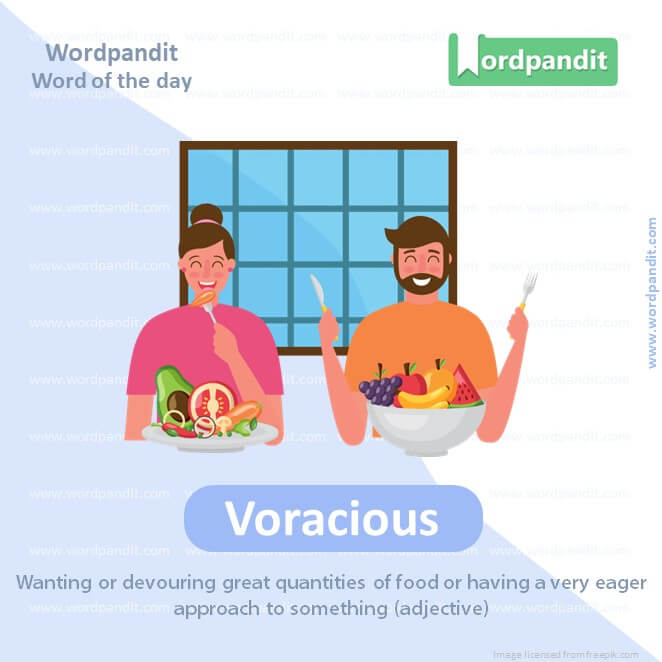Daily Vocabulary Words: List of Daily Used Words in Leading Indian Newspapers
Hi there. Welcome to this special section @ Wordpandit. Our endeavour here is straightforward: highlighting daily vocabulary words that you would come across in leading newspapers in the country. We have included the following newspapers in our selection:
• The Times of India
• The Economic Times
• Hindustan Times
• Mint
• Indian Express
We are putting in extensive work to develop your vocabulary. All you have to do is be regular with this section and check out this post daily. This is your repository of commonly used words; essentially, we are posting a list of daily used words. Hence, this has significant practical application as it teaches you words that are commonly used in leading publications mentioned above.
Visit the website daily to learn words from leading Indian newspapers.

WORD-1: Aberration
CONTEXT: The sudden spike in crime rates in the otherwise peaceful town was seen as an aberration by local authorities.
SOURCE: Times of India
EXPLANATORY PARAGRAPH: Imagine you have a box of crayons, and they’re all blue except for one pink crayon. That pink crayon is different from the rest, right? “Aberration” is a word we use when something is different from what is usual or expected.
MEANING: A departure from what is normal or expected, typically one that is unwelcome. (noun)
PRONUNCIATION: Uhbearrayshun
SYNONYMS: Anomaly, irregularity, deviation, exception, rarity
USAGE EXAMPLES:
1. Snow in the summer is an aberration.
2. His rude behavior was an aberration from his usual politeness.
3. The sudden spike in sales was seen as an aberration.
4. She hoped her bad grade was just an aberration and not a trend.

WORD-2: Aplomb
CONTEXT: The activist addressed the international forum with aplomb, impressing veterans and critics alike.
SOURCE: Hindustan Times
EXPLANATORY PARAGRAPH: Imagine you’re on a stage and everyone is watching, but you’re not nervous at all and you do everything perfectly. That’s called doing something with “aplomb.” It means you’re very confident and calm, even if the situation is tricky.
MEANING: Self-confidence or assurance, especially in demanding situations. (noun)
PRONUNCIATION: Uhplum
SYNONYMS: Poise, self-assurance, composure, confidence, coolness
USAGE EXAMPLES:
1. He handled the difficult questions with aplomb.
2. She danced with such aplomb that the audience was mesmerized.
3. Despite the pressure, she finished the task with aplomb.
4. The speaker addressed the crowd with aplomb and grace.

WORD-3: Pejorative
CONTEXT: Using pejorative terms to describe communities can incite hate and should be avoided in public discourse.
SOURCE: Hindustan Times
EXPLANATORY PARAGRAPH: You know how sometimes people use words that aren’t nice and can hurt feelings? “Pejorative” is a word we use for those kinds of words – words that are insulting or mean.
MEANING: Expressing disapproval or criticism. (adjective)
PRONUNCIATION: Puhjoruhtiv
SYNONYMS: Derogatory, disparaging, denigratory, negative, insulting
USAGE EXAMPLES:
1. She used a pejorative term to describe her opponent.
2. The word has a pejorative connotation.
3. He was upset by the pejorative comments.
4. The article was criticized for its pejorative language.

WORD-4: Voracious
CONTEXT: India’s voracious appetite for digital content has led to a boom in the OTT platform industry.
SOURCE: Indian Express
EXPLANATORY PARAGRAPH: Think of a time when you were super, super hungry, and you ate a lot because everything tasted so good. “Voracious” is a word that means very, very hungry or wanting a lot of something.
MEANING: Wanting or devouring great quantities of food or having a very eager approach to something. (adjective)
PRONUNCIATION: Vohrayshus
SYNONYMS: Insatiable, ravenous, greedy, gluttonous, wolfish
USAGE EXAMPLES:
1. After the hike, he had a voracious appetite.
2. She is a voracious reader, always surrounded by books.
3. The child had a voracious curiosity about the world.
4. His voracious consumption of sweets was a concern.
WORD-5: Extemporaneous
CONTEXT: The leader’s extemporaneous speech at the rally resonated with the spontaneity of the crowd.
SOURCE: Times of India
EXPLANATORY PARAGRAPH: Imagine you’re asked to tell a story without any preparation. You just think quickly and start telling the story right away. When you do something like that, without planning, it’s called “extemporaneous.”
MEANING: Done without preparation or improvisation. (adjective)
PRONUNCIATION: Extempohraykneeus
SYNONYMS: Impromptu, spontaneous, unrehearsed, unscripted, off-the-cuff
USAGE EXAMPLES:
1. His extemporaneous speech was both surprising and impressive.
2. She gave an extemporaneous performance at the party.
3. The students had an extemporaneous debate.
4. The poem was beautiful, especially considering it was extemporaneous.
WORD-6: Incontrovertible
CONTEXT: The evidence provided was incontrovertible, leading to a swift conviction.
SOURCE: Indian Express
EXPLANATORY PARAGRAPH: Imagine you have a toy and there’s a big label on it that says “Made by Toy Company.” That means it’s very clear and no one can argue that the toy is made by that company. “Incontrovertible” is a big word we use when something is super clear and nobody can argue against it.
MEANING: Impossible to deny or disprove; undeniable. (adjective)
PRONUNCIATION: Incontrovertuhbull
SYNONYMS: Indisputable, undeniable, irrefutable, unquestionable, certain
USAGE EXAMPLES:
1. The evidence against the thief was incontrovertible.
2. Her talent is backed by incontrovertible achievements.
3. They provided incontrovertible proof of the claim.
4. The video footage was incontrovertible evidence of the incident.
WORD-7: Pulchritude
CONTEXT: The pulchritude of Kerala’s backwaters has attracted tourists from all over the world.
SOURCE: Indian Express
EXPLANATORY PARAGRAPH: Have you ever seen something or someone so pretty or beautiful that you just go “Wow!”? “Pulchritude” is a fancy word that means beauty. It’s like a special word for something that’s really, really beautiful.
MEANING: Physical beauty. (noun)
PRONUNCIATION: Puhlkritood
SYNONYMS: Beauty, loveliness, attractiveness, gorgeousness, comeliness
USAGE EXAMPLES:
1. The pulchritude of the garden took everyone’s breath away.
2. The actress was known for her exceptional pulchritude.
3. The landscape’s pulchritude was captured in the painting.
4. Visitors are often drawn to the region because of its natural pulchritude.
WORD-8: Vitriol
CONTEXT: The online space has seen an unfortunate rise in vitriol, with netizens attacking each other over differences of opinion.
SOURCE: Times of India
EXPLANATORY PARAGRAPH: Imagine someone being very, very mean with their words, like they’re trying to hurt someone’s feelings on purpose. “Vitriol” means very cruel or mean words or behavior.
MEANING: Cruel and bitter criticism or language. (noun)
PRONUNCIATION: Vitreeol
SYNONYMS: Venom, bitterness, spite, malice, hostility
USAGE EXAMPLES:
1. The article was full of vitriol against the politician.
2. She was surprised by the vitriol in his voice.
3. After the disagreement, he spewed vitriol at his friend.
4. The debate was marked by unexpected vitriol.
WORD-9: Rapporteur
CONTEXT: The UN rapporteur on human rights expressed concerns over the conditions of detention centers.
SOURCE: Hindustan Times
EXPLANATORY PARAGRAPH: Imagine someone in school who writes down what everyone says during a meeting or discussion. That person is like a “rapporteur.” A rapporteur is someone who reports what has been said or decided.
MEANING: A person who is appointed to report on the proceedings of a meeting or conference. (noun)
PRONUNCIATION: Raportur
SYNONYMS: Reporter, chronicler, recorder, scribe, correspondent
USAGE EXAMPLES:
1. The rapporteur presented the findings of the committee.
2. She was chosen as the official rapporteur for the event.
3. The rapporteur’s notes were thorough and detailed.
4. Every conference has a designated rapporteur to document the discussions.
WORD-10: Acerbic
CONTEXT: The columnist’s acerbic wit was both celebrated and feared in political circles.
SOURCE: Indian Express
EXPLANATORY PARAGRAPH: Have you ever tasted a lemon and felt how sour and sharp it is? When someone speaks in a sharp or biting way, kind of like the taste of a lemon, we say their words are “acerbic.”
MEANING: Sharp and forthright, especially in speech or writing. (adjective)
PRONUNCIATION: Uhsurbik
SYNONYMS: Sharp, biting, caustic, tart, cutting
USAGE EXAMPLES:
1. His acerbic wit often made people laugh and wince at the same time.
2. The review was acerbic, pointing out all the flaws.
3. She had an acerbic tone that made people listen.
4. The comedian’s acerbic comments were both funny and thought-provoking.
Vocabulary Words
When delving into the dynamic world of languages, the grandeur of ‘vocabulary words’ is all-encompassing. The importance of ‘vocabulary words’ in effective communication cannot be overstated; it’s these words that form the backdrop of any language, painting intricate pictures of thoughts and ideas.
Starting on the journey of learning ‘vocabulary words’, one should steer clear from rote memorization. The traditional structure of merely repeating words lacks the necessary context and application that actually embeds these words into your memory. To truly master the ‘vocabulary words’, one needs an integrated, immersive approach.
The first step towards mastering ‘vocabulary words’ is to engage with varied language mediums. Expanding beyond textbooks to read fiction, articles, blogs, and other forms of content not only diversifies your vocabulary but also acts as a mirror to reflect the practical application of these words. Essentially, you’re exposed to the words as they are commonly used, allowing you to truly understand their essence.
Empowering this journey, tech tools like language learning apps and memory-enhancing flashcards significantly aid in learning ‘vocabulary words’. These interactive tools provide a more engaging learning experience and hone word retention. Mnemonic devices, associating words with a unique story or visual image, enrich the process and make memory recall more efficient.
Practicing ‘vocabulary words’ by using them in day-to-day conversations exemplifies learning by doing. It also strengthens the neural pathways and improves overall word recall. This, coupled with regular revisions, ensures your grasp over ‘vocabulary words’ remains strong.
In conclusion, learning ‘vocabulary words’ is not just about adding words to your linguistic cupboard, but understanding their essence and utilizing them effectively. An inclusive approach to learning that combines diverse reading materials, technology tools, mnemonic devices and practice can really propel your mastery over ‘vocabulary words’. Remember, language is the bloodline of communication, and ‘vocabulary words’ are its heartbeat. ‘













